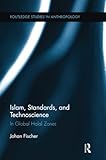Islam, Standards, and Technoscience : in Global Halal Zones
Material type: ArticleSeries: Routledge Studies in AnthropologyPublisher: New York : Routledge, 2017Copyright date: ©2016Description: 207 pages : illustrations ; 23 cmContent type:
ArticleSeries: Routledge Studies in AnthropologyPublisher: New York : Routledge, 2017Copyright date: ©2016Description: 207 pages : illustrations ; 23 cmContent type: - text
- unmediated
- volume
- 9781138060272 (paperback)
- HD9000.5 F57
| Item type | Current library | Call number | Copy number | Status | Date due | Barcode | |
|---|---|---|---|---|---|---|---|
| General H (Social Sciences: Economic, Industries, Commerce, Finance, Sociology, Family, Society) Ground floor | Universiti Islam Sultan Sharif Ali Ground Floor (Gadong Campus) | HD9000.5 F57 2017 c.1 (Browse shelf(Opens below)) | 1 | Available | 1050069013 |
Browsing Universiti Islam Sultan Sharif Ali shelves, Shelving location: Ground Floor (Gadong Campus) Close shelf browser (Hides shelf browser)

|

|

|

|

|

|

|
||
| HD8700.6 M354 2009 c.2 Essential of employment & industrial relations / | HD9000.5 C66 2016 c.1 Contemporary issues and development in the global halal industry : selected papers from the international halal conference 2014 / | HD9000.5 C66 2016 c.2 Contemporary issues and development in the global halal industry : selected papers from the international halal conference 2014 / | HD9000.5 F57 2017 c.1 Islam, Standards, and Technoscience : in Global Halal Zones | HD9000.5 H35 2016 c.1 Halal matters : Islam, politics and markets in global perspective / | HD9000.5 H35 2021 c.1 Halal logistics and supply chain management in Southeast Asia / | HD9000.5 R68 2021 c.1 Routledge handbook of sustainable and regenerative food systems / |
Includes bibliographical references and index
Halal (literally, "permissible" or "lawful") production, trade, and standards have become essential to state-regulated Islam and to companies in contemporary Malaysia and Singapore, giving these two countries a special position in the rapidly expanding global market for halal products: in these nations state bodies certify halal products as well as spaces (shops, factories, and restaurants) and work processes, and so consumers can find state halal-certified products from Malaysia and Singapore in shops around the world. Building on ethnographic material from Malaysia, Singapore, and Europe, this book provides an exploration of the role of halal production, trade, and standards. Fischer explains how the global markets for halal comprise divergent zones in which Islam, markets, regulatory institutions, and technoscience interact and diverge. Focusing on the "bigger institutional picture" that frames everyday halal consumption, Fischer provides a multisited ethnography of the overlapping technologies and techniques of production, trade, and standards that together warrant a product as "halal," and thereby help to format the market. Exploring global halal in networks, training, laboratories, activism, companies, shops and restaurants, this book will be an essential resource to scholars and students of social science interested in the global interface zones between religion, standards, and technoscience.
There are no comments on this title.


